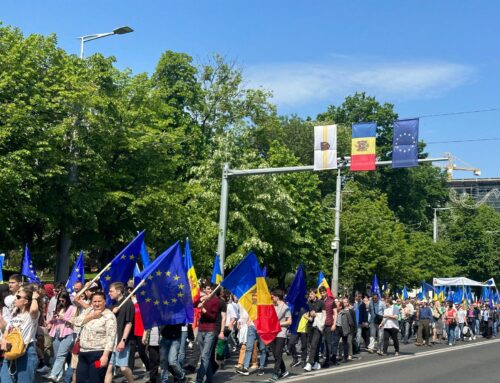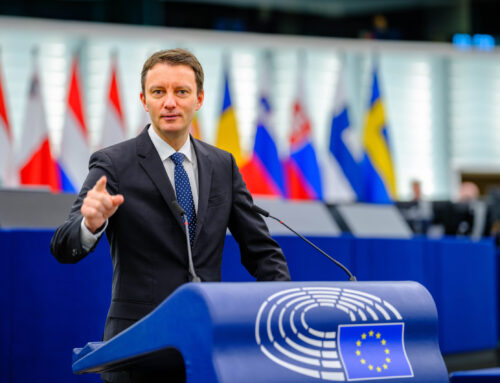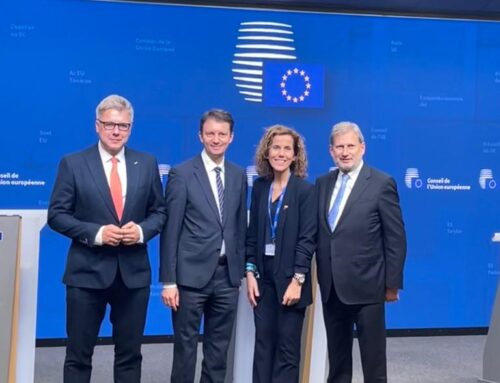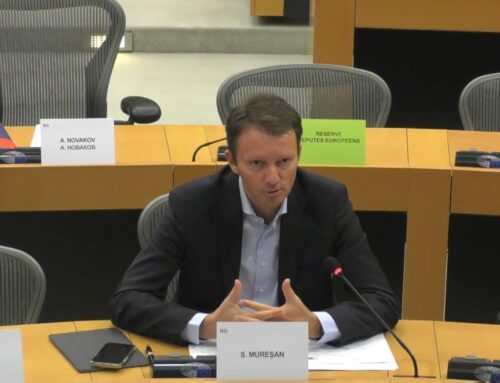The 2018 EU budget should be pro-growth in order to create well-paid jobs but simultaneously boost security both externally and internally, Siegfried Mureșan told Euractiv.com in an interview.
Siegfried Mureșan is a Romanian MEP from the European People’s Party group (Christian Democrats). He is the European Parliament’s rapporteur on the EU budget.
He spoke with EurActiv’s Sarantis Michalopoulos and Hannah Black.
What are the main priorities for the 2018 EU budget?
So the priorities that I have put forth in the budget should be jobs and growth on one side and safety and security on the other side. We clearly have to invest all resources that we have available in the EU budget to strengthen the European economy. And by this, I mean improving infrastructure, investing in innovation, research, development, exactly those areas that make the EU more competitive.
Because, the more competitive we are, the more investments come in — that generates growth and jobs. And the types of jobs which I want to see created in Europe are stable, well-paid jobs, socially-sustainable jobs — and these are only being created in sectors with high added value based on research, innovation, infrastructure: not only the traditional highways and railways but also the digital infrastructure to respond to the needs of investors.
But of course, all of this doesn’t work if citizens and companies don’t feel safe in Europe. That’s why my second priority is safety and security internally: to overcome the refugee crisis and manage the refugees which have come to Europe because, until now, the effort has been on what we do on day one of their arrival. But with those people who are here, and after they pass all the processes, once they receive the status of refugees and they have the right to stay here based on the international conventions that we have, we have to make sure that they are well-integrated.
And what about external security?
The best way that I believe we can achieve results in terms of external security is by strengthening the agencies of the Union which have responsibilities in justice, home affairs, and I mean primarily Europol, Eurojust, etc. And we have to enforce them, and we have to unleash the potential which exists in their corporation. There is a new need for them to cooperate to overcome terrorism, human trafficking, art trafficking in Europe, to have information better flow on who the dangerous people are, where they are coming from, where they are going to. This is what we want to achieve internally.
Externally, we need to be as safe as possible in our immediate neighborhood, both in the East and the South. In the East, it is clear of course that the situation is more aggressive, look how the situation in Ukraine is destabilising in the East, so I believe we have to stand primarily by the side of the three countries which have embarked on the pro-European path by having association agreements signed with the Union — Georgia, Ukraine, and Moldova. We must have the highest cooperation, dual-cooperation between the Union and the countries outside the Union.
The association agreement is the most comprehensive type of cooperation. So we would have to help those countries in extending the rule of law, public administration, fighting corruption, in reforming their institutions, and we should allocate financial resources there in exchange for precise commitments based on conditionality and making sure that the money reaches its intended beneficiaries.
So in the East, and the same applies for the South, for Northern Africa, for the Southern Mediterranean. We want to contribute to these countries so that living conditions are better.
In your report, you also emphasise the cooperation on defence.
Last year we committed to launching preparatory actions in the area of defence research at the European level. By this I mean we should spend money on defence only once at the European level and then share it among member states. Spend it once and share it among the countries, because we are partners.
We made the resources available last year, which the European Commission proposed, and this year, under my leadership, the intention is also to make the resources available that the Commission needs. This area is vital for a safe Europe, and we’re ready, with the resources we have available, to do everything necessary.
How did Brexit affect the 2018 budget?
Brexit will not happen next year, which means that the impact of all the discussions of Brexit on all the discussions of the budget for next year will be zero. Nothing will happen next year. Article 50 will be triggered now, negotiations will be concluded probably in two years’ time, but for the course of 2018, Britain will be a full member of the UK.
As for responsibilities, they will commit to the budget of the Union and they will benefit from it. By the way, there are significant areas in the budget where Britain is a large beneficiary. One of them is the big innovation programme called Horizon 2020. For good reason, Britain benefits a lot because its research institutes, its universities are wold leaders.
Brexit won’t happen next year — that’s why it will have zero impact on the budget. But, we have to be aware of the context in which we are working on and adopting this budget. If any elements come out of the negotiations with Britain regarding future relations with Europe and the UK, we will have to take them into account in the coming years.
And the most important element is the following: we are losing a net contributor to the budget of the Union, a country which contributed more than it benefitted in financial terms because it’s rich. And of course this amount will be missing, and the question will be what will close this gap: do you want countries to contribute more? Do you want to reduce the budget and do less, which we don’t want to do because we believe it is added value to the policies of the Union? Or option number three, and this is my preferred option: use the opportunity given by redefining the relationship between Europe and the UK and by the UK’s departure to also rethink the revenues of the EU?
In what way?
Until now, it has primarily been member states that are contributing to the Union, but the treaties of the Union state loud and clear that the Union should be financed based on own resources.
So we should start thinking about what own resources the Union can collect from citizens, from companies, so that the budget is built on a more predictable, long-term basis, so that if something happens with a member state and its contributions, we are not being affected. Of course this will happen with the UK, which is, of course, a singular event. So the predictability of the budget is not affected.
And if there are to be own resources in the budget, of course the burden on the citizens of Europe should be no single penny higher than it is right now. So we should think how we can reduce taxation at national level and at the end of the day the citizen should be in no way worse off. On the contrary, he should have more transparency in regards to the financing of the Union.
Sursa: EurActiv.com









Stay In Touch